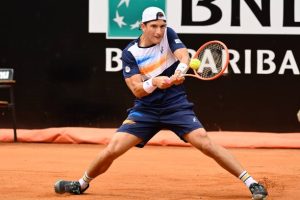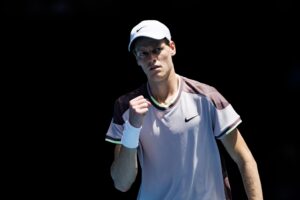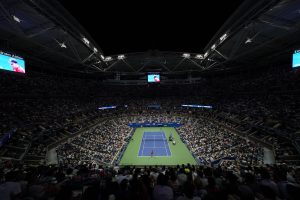For many tennis fans, the US Open – the final Grand Slam event of the season – is where the season proper ends. What follows in the autumn, with the two exceptions of the tour-ending finals and the Davis Cup, inevitably pales in comparison with the year’s events in the Majors. So, rather than wait until the end of the ludicrously over-long season, this seems the perfect time to review the four Grand Slam events to see what, if anything, 2018 has told us about the future of tennis.
First, the men.
AUSTRALIAN OPEN: WON BY ROGER FEDERER
At the start of 2018, it briefly appeared as if Roger Federer’s remarkable late-career resurgence (one comparable with the likes of Tom Brady in sport and David Bowie in art) might go on indefinitely. He retained the Australian Open title that he had won so marvelously and so unexpectedly in 2017, and it looked as if he was set fair for the other Majors in 2018.
In retrospect, however, it now appears that the early signs of the decline that became evident later in the year were already there. Federer did not have to face Rafael Nadal in the final again after Nadal succumbed to injury and retired in his quarterfinal against Marin Cilic (the first of his two Major retirements this year). Theoretically, therefore, he should have had a much easier time of it in the final than the year before, especially after he had defeated Cilic so comfortably in the 2017 Wimbledon Final.
However, Cilic was mercifully unblistered and fully focused in Melbourne, giving Federer a real run for his money and taking the match to five sets, before Federer finally won his 20th Major. Will it be his last? Well, if 2017 taught us never to write Roger the Great off, the rest of 2018 provided evidence that even the greatest player ever may finally be approaching the end of his career, or at least his time as a Major contender.
Embed from Getty Images
FRENCH OPEN: WON BY RAFAEL NADAL
Nadal recovered from his retirement at the Australian Open in typically impressive style. First, he recovered physically, spending several weeks away from the tour (thus missing the “Sunshine swing” through Indian Wells and Miami), before magnificently returning to court, and in particular the clay courts of Europe, which he again dominated in a way that no other player has dominated any surface before.
As in 2017, Nadal only lost once on the red dirt of Europe and as in 2017 it was Dominic Thiem who was his sole conqueror on clay. After defeating Nadal in Rome last year, Thiem bested him again in Madrid in 2018, and he carried his own impressive form through to Paris, where he reached his first Grand Slam final. In a remarkably even first set (at least until Thiem’s last and disastrous service game), the young Austraian gave notice that he is potentially the Clay King’s successor. But for now at least, Nadal remains imperious on the red stuff and he eventually won in straight sets to claim an almost unbelievable 11th French Open title.
Embed from Getty Images
WIMBLEDON: WON BY NOVAK DJOKOVIC
Up until Wimbledon, the 2018 Majors had looked very similar to the 2017 Majors, which were all claimed by either Federer or Nadal, but the pair’s recent duopoly of the men’s Majors finally came to an end in London this summer. However, rather than one of the “Next Gen” of players, such as Thiem or Alexander Zverev, making their breakthrough at Major level, the greatest grass court tournament in the world (and arguably the greatest tennis tournament of any kind) was won by the Third Man of tennis, Novak Djokovic.
Everything seemed set fair for Federer to retain his Wimbledon title and equal Martina Navratilova’s record of nine singles victories, just as Nadal had equalled Margaret Court’s astonishing achievement of winning the same Major 11 times (Court won the Australian Open that many times) a month earlier. That was until Kevin Anderson rose from the dead (at least in sporting terms) in their quarterfinal, coming back from two sets down to defeat the Swiss in five sets.
Thus, it was left to Djokovic and Nadal to fight it out in a genuinely epic semi-final, which Djokovic eventually won 10-8, that completely eclipsed the final itself, in which Anderson, exhausted after his own epic semi-final win over John Isner (claiming the fifth set 26-24!), was barely present, let alone capable of performing at his best. Thus, after two years in the tennis wilderness, the “Djok” was back and winning Majors once again.
Embed from Getty Images
US OPEN: WON BY NOVAK DJOKOVIC
After winning the US Open to go alongside his Wimbledon triumph, Novak Djokovic was not just back but back on top of men’s tennis (whatever his new ranking of World No. 3, behind Nadal and Federer, says to the contrary). As at Wimbledon, the US Open final itself, against Juan Martin del Potro, was something of an anti-climax after earlier and more extraordinary matches, in particular the quarter-final between Nadal and Thiem, which Nadal eventually won in a fifth-set tie-break. Clearly, that match took an awful lot out of Nadal and eventually he had to retire, as he had in Australia, from his semi-final against del Potro.
In New York, Djokovic demonstrated triumphantly that he has now recovered completely from the mental and physical demons that have beset him ever since he finally won the French Open in 2016 to complete both the career Grand Slam of winning all four Majors and the so-called “Nole Slam” of holding all four Major titles at once, even if he had not won them all in the same year, as would be the case in a genuine Grand Slam.
There are probably several reasons for the Serb’s re-emergence. He himself put it down to going mountain-climbing after losing his French Open quarterfinal to Marco Cecchinato, and thereby regaining his perspective on tennis in particular and life in general. It is also possible that he was inspired by, if not actually envious of, the Major victories of Federer and Nadal in 2017. A personal opinion is that the decisive factor was his finally ditching all the “superstar coaches” (Becker and Agassi) and going back solely to the man who had led him to the top in the first place, Marián Vajda.
Embed from Getty Images
SO WHERE NOW, IN 2019 AND BEYOND?
As at the end of every Grand Slam season, it is inevitable to look ahead and wonder what will happen next, but that instinct is probably more acutely felt this year than it has been for many years. That is because men’s tennis at the moment seems stuck almost in a kind of holding pattern, where the Big Three – Federer, Nadal and Djokovic – are still dominating, but two of them – Federer and Nadal – are finally showing that they cannot go on forever. Federer could not repeat his 2017 achievement of winning two Majors in a calendar year (which was the first time he had done so since 2009), whereas Nadal, who is five years younger than Federer, is once again showing all the physical fragility that has dogged him throughout his career and particularly in the last few years.
It is likely that one of two things will happen in the men’s Majors in 2019. The first is that Djokovic will build on his two Major successes of 2018 and at least repeat his “Nole Slam” of 2015-16 by claiming the first two Grand Slams of the year, the Australian and French. Of course, given his recent form it is not impossible that he will go on to win all four Majors next year, giving him a genuine calendar Grand Slam, which would make him only the third man in tennis history (after Don Budge in 1938 and Rod Laver in both 1962 and 1969) to do so. If he does, even the biggest Fed-Head or Rafaelite would have to applaud and acknowledge him as being at least the equal, if not the superior, of their own favourite.
The other possibility, of course, is that someone outside the Big Three will win a Major for the first time since Stan Wawrinka’s US Open victory in 2016. Perhaps Thiem can finally go all the way and claim a first Grand Slam win, or perhaps Zverev can finally convert all that undoubted potential into hard silver.
Either way, whether Djokovic wins it all or a young pup at last wins a Major, it is likely that the Federer-Nadal era, which now stretches back for more than 13 years to Nadal’s first French Open triumph, is finally coming to an end. But of course, that was confidently asserted at the end of 2016, when both the great men were off the tour for several months through injury, and we all know what happened next.
Next week, the Women’s Majors Review of 2018.






